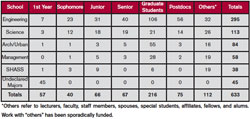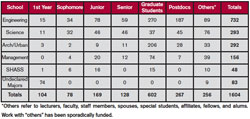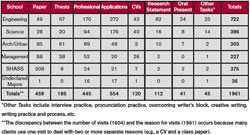
| Vol.
XXV No.
4 March / April 2013 |
| contents |
| Printable Version |
30th Anniversary of the Writing
and Communication Center
This year marks the 30th anniversary of MIT’s Writing and Communication Center (WCC) as a professional teaching institution. Started by the Program in Writing and Humanistic Studies, which is now Comparative Media Studies/Writing (CMS/W)), the WCC is firmly based on research in composition studies, rhetorical theory, and writing center pedagogy.
Our name says it all – we provide advice on all aspects of writing, oral presentation, and communication in general.
Those teaching in the WCC are all lecturers in CMS/W. They all have advanced degrees (e.g., three have degrees in Teaching English as a Second Language), all are published writers, all have years of experience as college classroom teachers, and all have many years’ experience working with MIT students and faculty. For example, our newest hire joined us in 2006, our longest serving lecturer has been with us since the fall of 1983, and I began the Center back in 1982. Several of our lecturers split their time between the WCC and the Writing Across the Curriculum (WAC) program, thus gaining even more up-close-and-personal insight into the genres and needs of every department.
Who uses the WCC?
Throughout the WCC’s 30 years, we have worked with people from literally every MIT department and School.
Unlike many writing centers which work only with undergraduate students, MIT’s WCC also works with graduate students and postdocs. We work with writers at all skill levels. In fact, some faculty members send us their best writers and speakers in order to make them even better communicators. On average, each year we see about 1300 unique clients who make between 3000-3300 visits. The figures from fall 2012 are typical, with 633 unique clients consulting us (see Table 1).

(click on image to enlarge)
How much is the WCC used?
Nationally, a 50% usage rate in writing centers is considered good (usage rate is the number of clients seen divided by the number of available appointments). The usage rate for MIT’s WCC has ranged from 83-90% over the last two-and-a-half decades. When we receive funding for summer hours, the summer usage rate is between 95-100%. In fall 2012, for example, there were 1604 visits made, and our usage rate was 90.1% (see Table 2).

(click on image to enlarge)
As Tables 1 and 2 clearly show, MIT’s WCC is much more than just an undergraduate resource; it is a major resource for graduate students and postdocs as well.
Why do people consult the WCC?
Reasons for consulting the WCC are as varied as the types of communication that occur both on campus and in the professional world (see Table 3).

(click on image to enlarge)
During fall 2012, we dealt with 249 papers for Communication Intensive (CI) courses (171 for CI-Humanities courses and 78 for CI-Major courses).
As Table 3 suggests, we work not only with course papers and theses, but also with professional tasks (conference papers, book and grant proposals, articles and books for publication), with applications, letters, CVs and resumes, research and teaching statements.
Over the years, literally hundreds of theses and books have contained acknowledgements thanking the Center and its individual lecturers for help in making their projects successful.
In addition to documents, we help with oral presentations – developing both the content of the presentations and the accompanying slides. We offer practice for oral presentations, pronunciation, and interviews. We help clients overcome writer’s block and anxiety about speaking in class (or in front of an audience).
Although the WCC’s major mission is one-on-one consultations, we do other things as well.
- During IAP, we sponsor events such as “How to Write a Great Abstract,” “Writing Effective Proposals,” and the “Dissertation Support Group.”
- We work with the Graduate Student Council’s Dissertation Boot Camp.
- In 2002, I started and have sponsored ever since the MIT Writers’ Group. Its members have included undergraduate and graduate students, faculty, and staff members – anyone interested in writing fiction, personal essays and memoirs, other types of non-fiction, poetry, and drama. Several of our members have published pieces they worked on in Writers’ Group, and two of our undergraduate members have won Ilona Karmel Writing Prizes.
| Back to top |
What is the WCC’s role?
The WCC is a teaching institution. We do not edit, proofread, or re-write documents. Instead, we teach our clients how to be better writers and better speakers. When clients visit the WCC, they agree to the following statement: “I understand that the Writing and Communication Center’s goal is to teach me how to be a better writer and that the Center does not edit or proofread documents. I also understand that the goal of any session is to teach something rather than to get all the way through any document.”
Of course, the documents improve as a by-product of the teaching, but, more importantly, so do the writers.
How do clients feel about sessions in the WCC?
After each session, a client fills out a survey and deposits it in a locked “ballot box,” thus guaranteeing anonymity. This practice gives us good insight into how we are doing. We ask questions using a 7-point Likert scale (where a 7 means “agree strongly” and a 1 means “disagree strongly” – i.e., the same approach used for classroom evaluations).
- For the statement “I learned something new about writing or oral presentation during this session,” 80% of clients circled 7, strongly agreeing, and another 13% circled 6. Given the fact that many of our clients make repeat visits to the WCC, that 93% is a strong testimony to the amount and quality of teaching that occurs.
- For the survey statement “I found this session very helpful,” 88% of clients agreed strongly by circling 7, and another 8% circled 6. In other words, 96% of sessions were deemed helpful or very helpful.
- In short, the WCC’s lecturers are very effective teachers.
What is taught in a typical session?
Over 95% of our teaching deals with higher order issues such as analyzing and addressing particular audiences, developing and refining ideas, exploring the implications of ideas, organizing large amounts of material effectively, translating a visual concept into written form, shaping material into effective communication, adjusting tone, polishing style, and turning turgid language into concise, reader-friendly prose. The rest of our teaching involves grammar, word choice, shades of meaning, and the like.
What lies ahead?
As we begin our next decade, the WCC stands firmly planted in the Program of Comparative Media Studies/Writing, drawing upon and adding to CMS/W’s expertise in all aspects of communication. We will continue to work with clients from across the Institute, helping with everything from applications to audience analysis, from evidence to exposition, from grammar to graphs, from papers to proposals, from resumes to research statements, from style to speeches and slides.
You may recommend or require visits to the Center for individual students or for your whole class, for advisees, and for those writing dissertations under your direction. On our homepage (writing.mit.edu/wcc), simply click “Recommended/Required Consultation at the Writing Center” in the left navigation bar, or go directly to writing.mit.edu/node/214 and fill out the form. We will notify you when your student(s) have consulted with us.
One way that you can help us to help your students is by alerting or reminding your students about the WCC. If possible, please post the following on your syllabi and Websites:
The Writing and Communication Center (12-132) offers free one-on-one professional advice from lecturers (who are published writers) about all types of academic, creative, and professional writing and about all aspects of oral presentations. Go to writing.mit.edu/wcc/appointments and register to make appointments online. The Center’s core hours are Monday-Friday, 9:00 a.m.-6:00 p.m.; evening hours vary by semester. Please check the online scheduler for up-to-date hours.
If you have any questions, suggestions, or requests, please contact me directly: smstrang@mit.edu or call 617-253-4459.
| Back to top | |
| Send your comments |
| home this issue archives editorial board contact us faculty website |